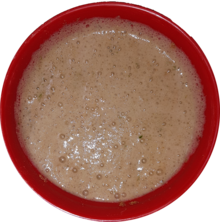Hulbah: Difference between revisions
Appearance
Content deleted Content added
mNo edit summary |
m Yemeni link. |
||
| (2 intermediate revisions by 2 users not shown) | |||
| Line 9: | Line 9: | ||
}} |
}} |
||
{{Arab cuisine}} |
{{Arab cuisine}} |
||
'''Hulbah''', '''holbah''', '''helbeh''' or '''hilbeh''' ({{lang-ar|حلبة}}) is a [[condiment]] made from ground [[fenugreek]] seeds. A traditional Yemeni food,<ref>{{Cite news|url=https://www.geniuskitchen.com/recipe/hilbeh-traditional-spiced-fenugreek-dip-from-yemen-385725|title=Hilbeh - Traditional Spiced Fenugreek Dip From Yemen Recipe - Genius Kitchen|access-date=2018-10-29}}</ref> now popularized among other cultures as well, especially by [[Yemenite Jews]] in Israel, who have introduced it to other ethnic groups.<ref>{{Citation |contribution=The Yemenite Cuisine |title=Ascending the Palm Tree: An Anthology of the Yemenite Jewish Heritage|last=Mizrachi|first=Avshalom|author-link=:he:אבשלום מזרחי |editor1=Rachel Yedid|editor2=Danny Bar-Maoz|publisher=E'ele BeTamar|place=Rehovot|page=129 |year=2018 |language=en |oclc=1041776317 }}</ref> ''Hulbah'' greatly expands when added to water. When whisked in a bowl, it takes on a light, frothy texture. It is consumed almost every day domestically in Yemen, and can be eaten by itself or added to ''[[saltah]]'' and ''[[fahsa]]''.<ref>{{Cite web|url=http://jimenaexperience.org/yemen/about/culture/hilbe/|title=Hilbeh|website=jimenaexperience.org|access-date=2018-10-29}}</ref> A dollop of ''hulbah'' is often dished out of the larger batch and added to hot soup. |
'''Hulbah''', '''holbah''', '''helbeh''' or '''hilbeh''' ({{lang-ar|حلبة}}) is a [[condiment]] made from ground [[fenugreek]] seeds. A traditional [[Yemen|Yemeni]] food,<ref>{{Cite news|url=https://www.geniuskitchen.com/recipe/hilbeh-traditional-spiced-fenugreek-dip-from-yemen-385725|title=Hilbeh - Traditional Spiced Fenugreek Dip From Yemen Recipe - Genius Kitchen|access-date=2018-10-29}}</ref> now popularized among other cultures as well, especially by [[Yemenite Jews]] in Israel, who have introduced it to other ethnic groups.<ref>{{Citation |contribution=The Yemenite Cuisine |title=Ascending the Palm Tree: An Anthology of the Yemenite Jewish Heritage|last=Mizrachi|first=Avshalom|author-link=:he:אבשלום מזרחי |editor1=Rachel Yedid|editor2=Danny Bar-Maoz|publisher=E'ele BeTamar|place=Rehovot|page=129 |year=2018 |language=en |oclc=1041776317 }}</ref> ''Hulbah'' greatly expands when added to water. When whisked in a bowl, it takes on a light, frothy texture. It is consumed almost every day domestically in Yemen, and can be eaten by itself or added to ''[[saltah]]'' and ''[[fahsa]]''.<ref>{{Cite web|url=http://jimenaexperience.org/yemen/about/culture/hilbe/|title=Hilbeh|website=jimenaexperience.org|access-date=2018-10-29}}</ref> A dollop of ''hulbah'' is often dished out of the larger batch and added to hot soup. |
||
==References== |
==References== |
||
{{reflist}} |
{{reflist}} |
||
[[Category:Yemeni cuisine]] |
[[Category:Yemeni cuisine]] |
||
[[Category:Israeli |
[[Category:Israeli condiments]] |
||
{{Yemen-stub}} |
{{Yemen-stub}} |
||
{{arab-cuisine-stub}} |
{{arab-cuisine-stub}} |
||
{{israel-cuisine-stub}} |
|||
Latest revision as of 21:18, 11 July 2024
 | |
| Place of origin | Jemen |
|---|---|
| Main ingredients | fenugreek seeds, water, Leek, salt, Citric acid |
 |
| Part of a series on |
| Arab cuisine |
|---|
Hulbah, holbah, helbeh or hilbeh (Arabic: حلبة) is a condiment made from ground fenugreek seeds. A traditional Yemeni food,[1] now popularized among other cultures as well, especially by Yemenite Jews in Israel, who have introduced it to other ethnic groups.[2] Hulbah greatly expands when added to water. When whisked in a bowl, it takes on a light, frothy texture. It is consumed almost every day domestically in Yemen, and can be eaten by itself or added to saltah and fahsa.[3] A dollop of hulbah is often dished out of the larger batch and added to hot soup.
References
[edit]- ^ "Hilbeh - Traditional Spiced Fenugreek Dip From Yemen Recipe - Genius Kitchen". Retrieved 2018-10-29.
- ^ Mizrachi, Avshalom [in Hebrew] (2018), "The Yemenite Cuisine", in Rachel Yedid; Danny Bar-Maoz (eds.), Ascending the Palm Tree: An Anthology of the Yemenite Jewish Heritage, Rehovot: E'ele BeTamar, p. 129, OCLC 1041776317
- ^ "Hilbeh". jimenaexperience.org. Retrieved 2018-10-29.
